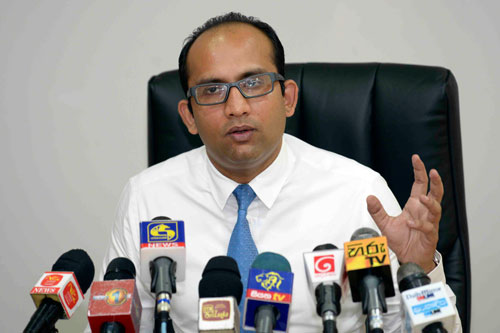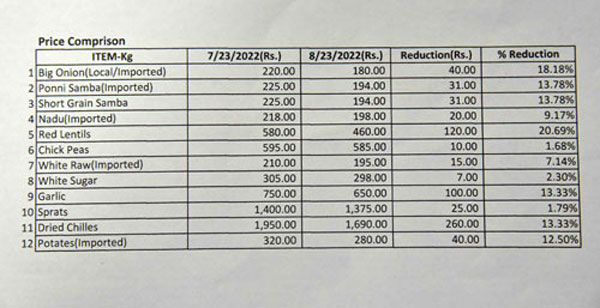Sri Lanka has moved into address issues over inflation of food prices, but the measures may take weeks to reach the public.
The Lanka Sathosa today announced the reduction of 12 items, sold at their outlet as one of the steps in addressing the issue, but it was still unlikely the government would be able to get traders to reduce prices immediately.
Chairman Pasanda Yap Abeywardena of Lanka Sathosa addressing a press conference today said accordingly, the price of Ponni Samba (Imported) has been reduced by Rs. 21 per kilogram while Nadu (Imported) by Rs. 2 and Dhal has been reduced by Rs. 25 and now sold at Rs 460.
He explained that the prices were lower than the prices of last year.
The price of Sprats has been reduced by Rs. 25 and will be sold at Rs 1,375.
Mr Abeywardena explained that though the prices were reduced, customers should make sure they purchase other items from their outlets inorder for the sustainability of the Institutions. “People should not come only for the cheap items.

Chairman Lanka Sathosa: Pasanda Yapa Abeywardena

Price Comparison
The moves came amidst warnings from the World Bank that Sri Lanka was among a list of 10 nations seeing the worst price increases.
Sri Lanka’s was ranked fourth with 26 per cent with 26 per cent food inflation in real terms, compared with the same period last year.
Lebanon topped the ranking with 122% food inflation in real terms, compared with the same period last year. This was followed by Zimbabwe with 23%. A wide range of countries defined as middle-income also made the list, such as Sri Lanka, Turkey, and Iran, a report said..
The bank said that seven countries face a particular risk of overlapping food and debt crises — including Afghanistan, Mauritania, Somalia, Tajikistan, and Yemen — highlighting how the dual concern is affecting multiple regions.
According to Sri Lanka’s National Consumer Price Index the food inflation was 82 per cent last month.
The overall rate of inflation as measured by the NCPI on a year to year basis as at July stood 66.7 per cent.
Meanwhile the Government’s decision to drastically raise kerosene oil prices from Monday is likely to have a severe impact on the low income group families. The increase was by Rs 253 and thereby a liter now sells at Rs 340.
Leave Comments